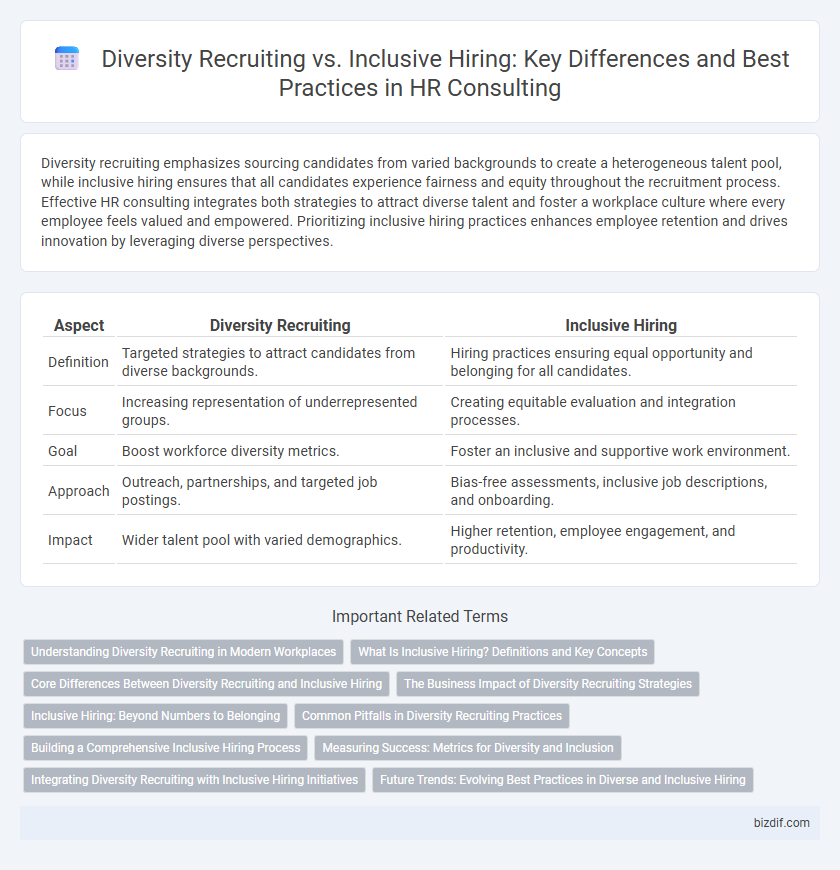Diversity recruiting emphasizes sourcing candidates from varied backgrounds to create a heterogeneous talent pool, while inclusive hiring ensures that all candidates experience fairness and equity throughout the recruitment process. Effective HR consulting integrates both strategies to attract diverse talent and foster a workplace culture where every employee feels valued and empowered. Prioritizing inclusive hiring practices enhances employee retention and drives innovation by leveraging diverse perspectives.
Table of Comparison
| Aspect | Diversity Recruiting | Inclusive Hiring |
|---|---|---|
| Definition | Targeted strategies to attract candidates from diverse backgrounds. | Hiring practices ensuring equal opportunity and belonging for all candidates. |
| Focus | Increasing representation of underrepresented groups. | Creating equitable evaluation and integration processes. |
| Goal | Boost workforce diversity metrics. | Foster an inclusive and supportive work environment. |
| Approach | Outreach, partnerships, and targeted job postings. | Bias-free assessments, inclusive job descriptions, and onboarding. |
| Impact | Wider talent pool with varied demographics. | Higher retention, employee engagement, and productivity. |
Understanding Diversity Recruiting in Modern Workplaces
Diversity recruiting in modern workplaces involves proactively sourcing candidates from a wide range of backgrounds, including ethnicity, gender, age, and abilities, to build a workforce that reflects diverse perspectives. This strategy enhances innovation and problem-solving by integrating varied cultural insights and experiences. Effective diversity recruiting requires leveraging unbiased recruitment tools, promoting equitable job descriptions, and engaging with diverse talent pools to achieve genuine representation.
What Is Inclusive Hiring? Definitions and Key Concepts
Inclusive hiring refers to recruitment practices that actively create equitable opportunities for candidates from diverse backgrounds by removing biases and barriers throughout the hiring process. It emphasizes building a workplace culture where all individuals, regardless of race, gender, age, disability, or other characteristics, feel valued and supported, fostering long-term employee engagement and retention. Key concepts include bias mitigation, equitable job descriptions, diverse interview panels, and continuous inclusion training to ensure fair assessment and integration of talent.
Core Differences Between Diversity Recruiting and Inclusive Hiring
Diversity recruiting centers on attracting candidates from varied demographic backgrounds to increase workforce representation, emphasizing metrics such as race, gender, and ethnicity. Inclusive hiring goes beyond demographics to create equitable recruitment processes, ensuring candidates feel valued and supported throughout their hiring journey. Core differences lie in diversity recruiting's focus on candidate sourcing, while inclusive hiring prioritizes experiential fairness and workplace integration.
The Business Impact of Diversity Recruiting Strategies
Diversity recruiting strategies enhance organizational performance by attracting a wider talent pool that brings varied perspectives and innovative solutions. Companies implementing effective diversity recruiting experience higher employee engagement, improved decision-making, and access to new markets. Prioritizing diversity in recruitment directly correlates with increased profitability and sustainable business growth.
Inclusive Hiring: Beyond Numbers to Belonging
Inclusive hiring extends beyond diversity recruiting by embedding belonging into workplace culture, ensuring every individual feels valued and empowered. It focuses on creating equitable opportunities and removing systemic barriers throughout the recruitment process, enhancing employee engagement and retention. Companies adopting inclusive hiring practices report higher innovation rates and better organizational performance due to diverse perspectives being authentically integrated.
Common Pitfalls in Diversity Recruiting Practices
Common pitfalls in diversity recruiting practices include overemphasizing demographic quotas without fostering an inclusive culture, which can lead to tokenism and high turnover rates. Ignoring the importance of unbiased recruitment tools and practices often results in overlooking qualified candidates from diverse backgrounds. Failure to provide training on inclusive interviewing techniques and unconscious bias further undermines efforts to build truly diverse and effective teams.
Building a Comprehensive Inclusive Hiring Process
Diversity recruiting targets increasing representation of underrepresented groups, while inclusive hiring ensures equitable candidate evaluation and fosters belonging for all employees. Building a comprehensive inclusive hiring process involves structured interviews, bias training, and accessibility accommodations to create fair opportunities. Organizations that integrate these strategies improve retention rates and cultivate innovative, high-performing teams.
Measuring Success: Metrics for Diversity and Inclusion
Effective diversity recruiting and inclusive hiring require distinct measurement metrics to evaluate success accurately. Diversity recruiting focuses on quantitative metrics such as demographic representation, applicant tracking data, and diversity hire rates. Inclusive hiring emphasizes qualitative measures like employee engagement scores, retention rates of diverse talent, and inclusion index surveys to assess workplace culture integration.
Integrating Diversity Recruiting with Inclusive Hiring Initiatives
Integrating diversity recruiting with inclusive hiring initiatives enhances organizational culture by attracting a broad spectrum of candidates while ensuring equitable practices throughout the hiring process. Leveraging data-driven strategies, HR consulting firms optimize talent acquisition by combining diversity metrics with inclusive interview techniques that reduce bias. This dual approach fosters sustainable workforce representation, improves employee engagement, and supports long-term business performance.
Future Trends: Evolving Best Practices in Diverse and Inclusive Hiring
Future trends in HR consulting emphasize the integration of diversity recruiting and inclusive hiring to enhance workforce innovation and equity. Data-driven approaches leverage AI and analytics to reduce bias and improve candidate matching across gender, ethnicity, and disability status. Evolving best practices prioritize continuous cultural competence training and employee engagement strategies to sustain inclusive work environments.
Diversity Recruiting vs Inclusive Hiring Infographic

 bizdif.com
bizdif.com